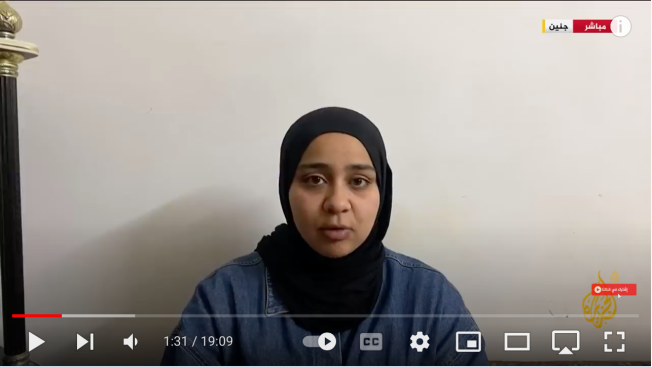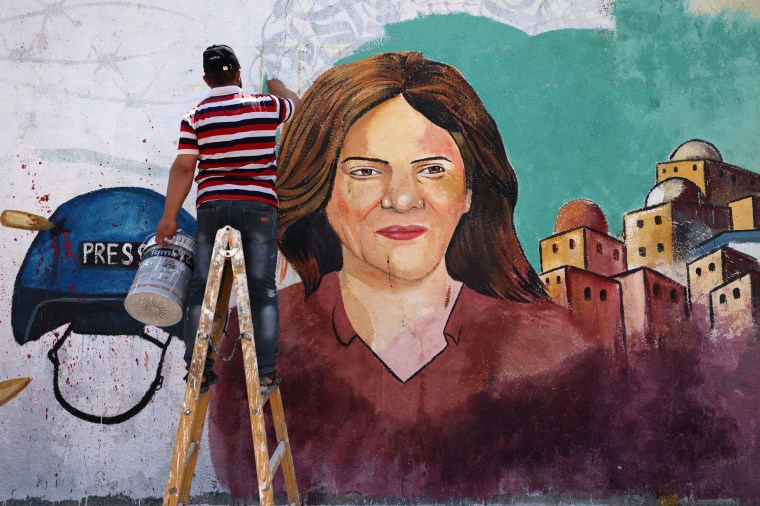Al-Jazeera correspondent Shireen Abu Akleh, whose body was laid to rest in Jerusalem Friday, was an inspiration to a generation of female Palestinian reporters – including one who witnessed Abu Akleh’s killing on May 11.
Shatha Hanaysha, a 29-year-old correspondent for news website Ultra Palestine and contributor to regional news website Middle East Eye, was next to Abu Akleh in the Israeli-occupied West Bank city of Jenin when Abu Akleh was shot in the head.
“I wanted to reach her, but I just couldn’t,” Hanaysha said, recalling the danger of extending her hand to touch her colleague’s body.
In an interview with CPJ, Hanaysha recounted the incident and spoke about Abu Akleh’s influence in the occupied Palestinian Territories and beyond. Abu Akleh’s funeral was also met with violence as Israeli forces beat up mourners.
CPJ called for an international investigation into Abu Akleh’s killing, which Al-Jazeera alleged was committed by Israeli forces “in cold blood.” The Israeli military said either Palestinian or Israeli fire killed the journalist and that Israel is continuing to investigate the incident in a statement emailed to CPJ.

What happened on the day Shireen Abu Akleh was killed?
Shatha Hanaysha: We wore our helmets and “Press” vests and moved as a group of journalists to try and enter Jenin [refugee] camp. We waited about 10 minutes until the Israeli army saw us, and after that, we started moving further. We moved about 100 meters [328 feet] and then the shooting started at us. If the army wanted to ban us from reaching the area, they would have fired warning shots.
We were trapped. Behind us was a wall, and the street was wide in front of us. Any move meant danger. When shooting started, [journalist] Mujahed al-Saadi jumped on the wall and told us to do so too, but I froze with fear. We moved back.
Shireen started screaming “Ali was hit. Ali was hit” [in reference to Al-Jazeera producer Ali al-Samoudi, who was also shot and injured]. They took him to the hospital, and then we were fired upon again. I was alone with Shireen when the [Israeli] occupation [forces] shot at us. I heard the shots but couldn’t imagine they were directed at us. I looked at Shireen and I thought that she just fell down. I was screaming, I knew she was hit, and then my colleagues started screaming. I just wanted to check if she was awake or not, but the shooting continued.
One of the guys on the street facing us tried to approach us but he couldn’t because it was too dangerous. He turned and came from behind, jumped on the wall behind us, and evacuated me, and then tried to assist Shireen. She couldn’t wake up. She didn’t wake up. That’s what freaked us out. She wasn’t waking up.
The shooting didn’t come from the Palestinian side. The street we were on was busy with moving cars. There weren’t any clashes, not even burning tires, which was the reason we had kept going – in order to get closer to the action and cover what was happening.
We were facing a house and an open space. We were fired upon from an area above us and shots hit the tree I was standing behind from above. It was where Israeli occupation forces were.
She was killed in Jenin and buried in Jerusalem. Every Palestinian village mourned her. I heard a person saying that he “grew up with Shireen.” We all did. We all lived with Shireen because she was in all of our houses since she joined Al-Jazeera in 1997. She left a mark in our hearts, in all Palestinian hearts.
Shireen’s colleagues covered her killing and funeral. They were filming, reporting, and crying. This will leave a mark that will never go away.
How did Shireen influence you as a female journalist?
Shireen was the first woman reporter I saw in my whole life. Back when I was young, there weren’t many news outlets, only Al-Jazeera. This channel was in every Palestinian house, we followed all the news on it. Most of the time, Shireen was the one covering the news. She was a leader to us, because she was so brave, her presence in the field was impeccable.
When I was young, my family members would tell me to “talk like Shireen.” When I was asked, “What do you want to be when you grow up?” I often answered, “I want to be a journalist like Shireen.” Shireen was my model and I wanted to be like her, a brave and successful professional journalist, a role model.
What was Shireen like as a colleague?
She was magnificent. Both on the personal and professional levels, she was great. She had more than 20 years of experience, and I only have seven, but she always treated me as a colleague with respect. She respected and treated everyone with love. She memorized people’s faces.
Everyone she reported on, including prisoners and martyrs’ families, were really saddened by the news of her killing. Everyone who watched her cried.
